|
|
|
Sort Order |
|
|
|
Items / Page
|
|
|
|
|
|
|
| Srl | Item |
| 1 |
ID:
124432
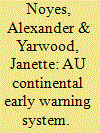

|
|
|
|
|
| Publication |
2013.
|
| Summary/Abstract |
Despite criticism from scholars, the Continental Early Warning System (CEWS) at the African Union (AU) has recently made significant progress in its capacity to monitor, analyse, and provide warning of impending conflict situations in Africa. However, CEWS remains constrained by human resource limitations, inchoate cooperation and information sharing with the early warning efforts of regional organizations, and unsystematic coordination with the various AU organs focusing on peace and security. Additionally, although the early warning-early response gap is narrowing at the AU, early response mechanisms continue to be constrained by limited capacity and issues of political will, as high-level political disagreements and issues of sovereignty militate against effective preventive action. Based on over two-dozen interviews with senior-level CEWS and AU officials, along with other relevant stakeholders, this paper highlights recent operational progress, identifies remaining gaps, and forwards policy options for the AU and international community to build on the gains of CEWS.
|
|
|
|
|
|
|
|
|
|
|
|
|
|
|
|
| 2 |
ID:
124445
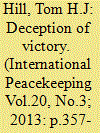

|
|
|
|
|
| Publication |
2013.
|
| Summary/Abstract |
This article examines the 40-year history of post-conflict reintegration of the Janatha Vimukthi Peramuna (JVP) in Sri Lanka. This case study demonstrates that post-civil war reintegration can be as complex and important to peace following an outright military victory as following a formally negotiated settlement. This finding challenges a dominant assumption in the civil wars literature: that decisive military victories create a simpler and more enduring peace because they remove the complexities of reintegration. As this example and others warn, if one examines a war-torn society through a five, ten or 20-year timeframe, then a military victory can appear a powerful agent of peaceful stability, negating the reintegration requirements of negotiated settlements. But if one applies a lens of 40 years or more, then a picture of repetitive violence can emerge that seriously questions the efficacy of military victory in securing long-term peaceful stability. Instead, as in cases of negotiated settlement, it is the complex dynamics of reintegration that come to the fore as a core condition for durable peace.
|
|
|
|
|
|
|
|
|
|
|
|
|
|
|
|
| 3 |
ID:
124443
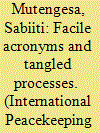

|
|
|
|
|
| Publication |
2013.
|
| Summary/Abstract |
Uganda's mass discharge of serving military personnel in the 1990s is touted as one of the most successful cases of donor-supported Disarmament, Demobilization and Reintegration (DDR). However, a closer look at that process reveals a much more complex and less dogmatic approach to managing armed factions than the linearly conceived model often encountered in the 'peacebuilding' literature. Contrary to common assumptions about that country's conflict management, particularly after the ascendance in 1986 of the Museveni government, the newly installed regime deliberately eschewed the policy of 'demobilization' and, in the process, made disarmament unnecessary, primarily by resisting donor pressure to subordinate long-haul pacification to short-term fiscal considerations. Using Uganda as a case study and DDR as a reference point, the article calls for a less perfunctory approach to the interpretation and management of the multifaceted processes of political development in the conflict-plagued pre-industrial countries of the Third World.
|
|
|
|
|
|
|
|
|
|
|
|
|
|
|
|
| 4 |
ID:
124439
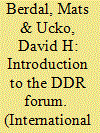

|
|
|
|
|
| Publication |
2013.
|
| Summary/Abstract |
Over the past two decades, international efforts to support the socio-economic adjustment of ex-combatants to the uncertain and often messy realities of postwar situations, have presented donor countries, NGOs and international organizations with complex, often formidable, institutional and logistical challenges. Many of these have been exhaustively and often expertly covered in the still burgeoning literature on disarmament, demobilization and reintegration (DDR). While they continue to merit scholarly and policy attention, the underlying focus of this special issue of International Peacekeeping is less on what we in the past have referred to as the mechanics of DDR - that is, how best to plan, organize, coordinate and fund DDR activities - than on the context and politics of reintegrating ex-combatants following protracted periods of armed conflict and civil war.
|
|
|
|
|
|
|
|
|
|
|
|
|
|
|
|
| 5 |
ID:
124435
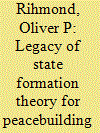

|
|
|
|
|
| Publication |
2013.
|
| Summary/Abstract |
The mainstream literature on state formation has provided the basis for peacebuilding and statebuilding praxes to focus on power and realist concepts of security and the state. The dominant focus on violence and how it shapes the state has been an important motif of peacebuilding and statebuilding literatures. However, state formation literatures also offer sociological, anthropological, and structural accounts as a basis for a post-colonial framework for peace, security, and order, which expose the limits of peacebuilding and statebuilding.
|
|
|
|
|
|
|
|
|
|
|
|
|
|
|
|
| 6 |
ID:
124434


|
|
|
|
|
| Publication |
2013.
|
| Summary/Abstract |
Based on a theoretical concept that distinguishes different dilemma types, the article identifies and analyses dilemma situations that arose for the international UN-led peace-building operation in its efforts to combat organised crime in post-war Kosovo. In order to cope with the various dilemmas that arose, the international peace-building operation engaged in compromises that entailed strategic trade-offs. Dilemmas and respective trade-offs in decision-making pertain to the fields of post-conflict security, political inclusion of post-conflict stakeholders, disarmament and demobilization, transfer of ownership, rule of law and local economy.
|
|
|
|
|
|
|
|
|
|
|
|
|
|
|
|
| 7 |
ID:
124450
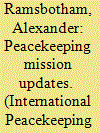

|
|
|
|
|
| Publication |
2013.
|
| Summary/Abstract |
All members of the National Commission for Dialogue and Reconciliation, including its President and Vice-Presidents, officially took office in March and April. There was criticism in some quarters that the selection process for membership had not been transparent and that there had been inadequate inclusion of religious, community and traditional leaders.
|
|
|
|
|
|
|
|
|
|
|
|
|
|
|
|
| 8 |
ID:
124446
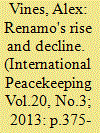

|
|
|
|
|
| Publication |
2013.
|
| Summary/Abstract |
Mozambique celebrated 20 years of peace in 2012. Renamo was a successful guerrilla force that mostly demobilized and disarmed. It also contested four presidential and parliamentary elections. Renamo became the largest opposition party in Africa until, 2002 but has since been less successful due to exclusion politics by the party of government Frelimo, and because of tactical mistakes by Afonso Dhlakama, Renamo's leader for 33 years. This paper argues that Dhlakama's leadership was critical in bringing an end to the conflict and delivering Renamo's demobilization, but he was unable to tactically change from a guerrilla mentality. Dhlakama's decision to return to rural central Mozambique in late 2012 and the armed violence that followed in 2013 was out of political desperation. Renamo lacks the support or resources to return Mozambique to civil war, and a splinter party, Movimento Democrático de Moçambique, has benefited.
|
|
|
|
|
|
|
|
|
|
|
|
|
|
|
|
| 9 |
ID:
124433
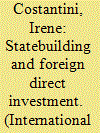

|
|
|
|
|
| Publication |
2013.
|
| Summary/Abstract |
Within the broader debate over the political economy of statebuilding, the role of foreign direct investment (FDI) in fragile and post-conflict settings is increasingly controversial but still understudied. This paper examines the tensions between the good governance agenda currently being implemented in Iraq and the investment dynamics occurring at the country's national and provincial levels. Drawing on disaggregated data, the paper argues that the flow of FDI is reinforcing destabilizing dynamics in Iraq by increasing levels of inequality, deepening the decentralization process, and undermining internal and external balances of power.
|
|
|
|
|
|
|
|
|
|
|
|
|
|
|
|
| 10 |
ID:
124441
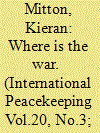

|
|
|
|
|
| Publication |
2013.
|
| Summary/Abstract |
The Sierra Leone civil war of 1991-2002 has widely been regarded as stemming from the desperate political and socio-economic conditions that affected the country's youth. Following the end to hostilities, there has been great concern to address youth grievances as a means of consolidating peace and stability. There have been frequent warnings in UN, NGO and academic reports of the dangers of limited progress in this regard, and it has been suggested that persistent pre-war conditions are undermining ex-combatants' investment in peace and increasing risks of a return to conflict. However, since 2002 Sierra Leone has experienced relatively low levels of violence. This article seeks to make sense of this seemingly propitious outcome. Informed by interviews conducted with ex-combatants between 2008-2012, it argues that risks of a return to arms have been exaggerated. Nevertheless, economic and political conditions continue to reconnect ex-combatants with violence in the context of 'peacetime.'
|
|
|
|
|
|
|
|
|
|
|
|
|
|
|
|
|
|
|
|
|